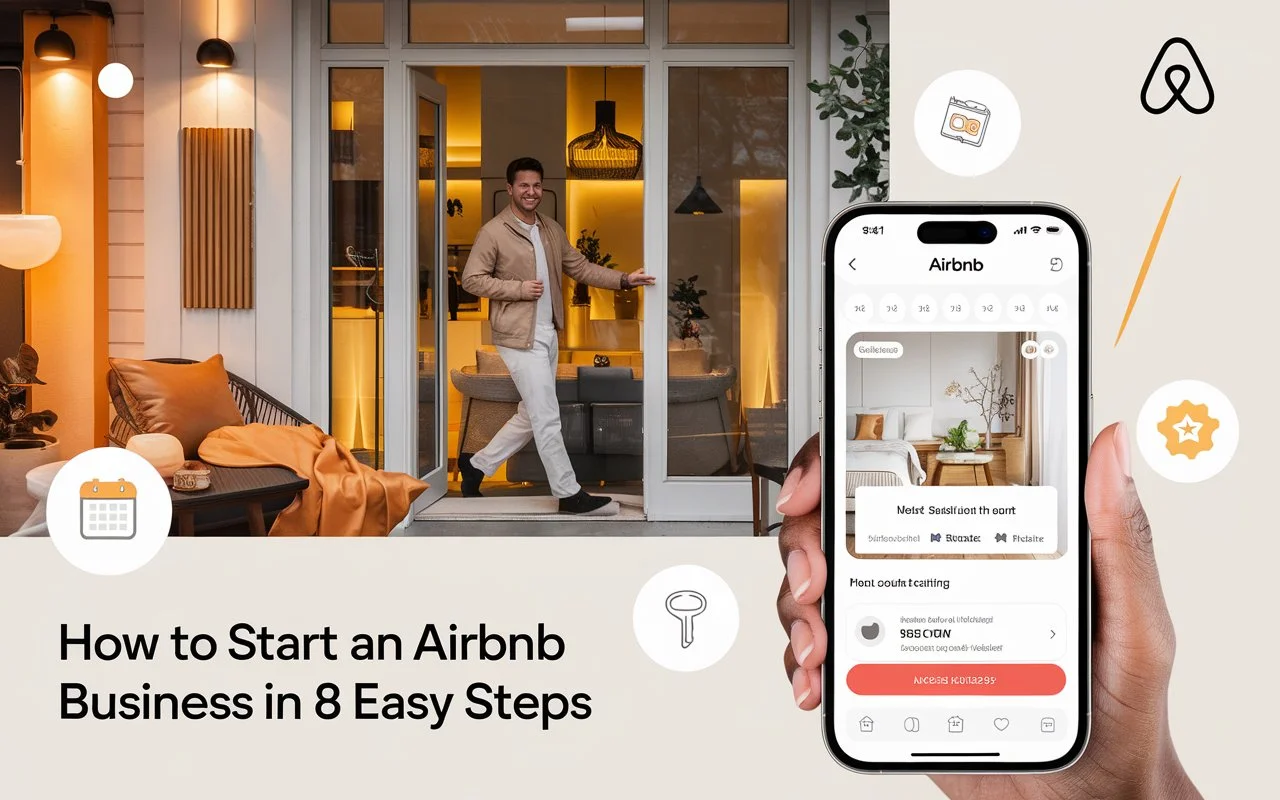Did you know that your spare room, vacation home, or even an entire property could become a source of steady income? With Airbnb, it’s never been easier to transform your extra space into a profitable business. Whether you’re renting out a single room or hosting travelers in a fully furnished apartment, becoming an Airbnb host can be both financially rewarding and personally fulfilling.
However, like any business, success on Airbnb requires careful planning and execution. In this guide, we’ll walk you through 8 easy steps to start your Airbnb business and set yourself up for success. Let’s dive in!
1. Evaluate Your Property and Decide What to Rent
The first step is to assess your property and decide what you’re comfortable renting out. Airbnb offers flexibility depending on your situation:
- Private Room : Ideal if you want to stay in the property while renting out a spare bedroom.
- Entire Home/Apartment : Perfect if you’re away frequently or have a second property to rent.
- Shared Spaces : If you’re okay with sharing common areas like the living room or kitchen, this could work too.
Consider what your target guests might prefer and ensure your space meets their needs.
Important Tip for Renters :
If you’re renting your property (not owning it), check your lease agreement and any Homeowners Association (HOA) rules. Some landlords and HOAs prohibit short-term rentals or subletting, so always seek permission before listing your space.
2. Check Local Laws and Regulations
Before diving in, research local laws and regulations related to short-term rentals. Many cities have specific requirements:
- Zoning Laws : Ensure your area allows short-term rentals.
- Taxes : You may need to collect occupancy taxes or report income to local authorities.
- Permits : Some locations require special permits or licenses to operate as a short-term rental host.
Failing to comply with these rules could lead to fines or legal issues, so do your homework upfront.
3. Create a Detailed and Attractive Listing
Your Airbnb listing is your storefront—it needs to stand out! Here’s how to craft a winning listing:
- Title & Description : Write a catchy title and detailed description. Highlight unique features like Wi-Fi, proximity to attractions, or luxurious amenities.
- Photos : Use high-quality, well-lit images of every room, the exterior, and key amenities. First impressions matter!
- Pricing : Research similar listings in your area to set competitive rates. Adjust prices seasonally or offer discounts for longer stays.
Transparency is key—be honest about your space to set realistic expectations.
4. Prepare Your Space for Guests
To create a memorable experience, ensure your space is clean, welcoming, and equipped with essentials:
- Deep Cleaning : A spotless space is non-negotiable. Consider hiring a professional cleaner if needed.
- Essentials : Stock up on fresh linens, towels, toiletries, and basic kitchen supplies. Thoughtful touches like snacks or a welcome note go a long way.
- Safety Features : Install smoke detectors, carbon monoxide detectors, and fire extinguishers. Safety should always come first.
A comfortable, inviting space encourages repeat bookings and positive reviews.
5. Set Clear House Rules
Establishing house rules helps prevent misunderstandings and ensures a smooth stay:
- No smoking or parties
- Quiet hours after 10 PM
- Specific check-in/check-out times
- Pet policies (if applicable)
Clear communication sets boundaries and fosters respect between you and your guests.
6. Market Your Listing and Build Your Reputation
Once your listing is live, focus on attracting guests and building a stellar reputation:
- Optimize Your Listing : Use keywords in your title and description that potential guests are likely to search for. Highlight nearby attractions and unique features.
- Respond Quickly : Prompt responses to inquiries improve your ranking on Airbnb and enhance guest satisfaction.
- Encourage Reviews : After each stay, kindly ask guests to leave a review. Positive feedback boosts your visibility and attracts future bookings.
Building trust and credibility takes time, but consistency pays off.
7. Create a Seamless Check-In and Check-Out Process
Guests value convenience, so streamline their arrival and departure:
- Self-Check-In : Offer lockboxes or keyless entry for hassle-free access.
- Instructions : Provide clear directions to your property, details about checking in, and where to find essentials.
- Personal Touch : A warm welcome message or handwritten note adds a personal touch.
- Check-Out Instructions : Clearly outline tasks like taking out the trash or leaving keys.
Effortless experiences lead to glowing reviews!
8. Manage Your Airbnb Business Efficiently
As your bookings increase, efficient management becomes crucial:
- Automate Communications : Use Airbnb’s messaging tools to send automated booking confirmations, check-in instructions, and reminders.
- Dynamic Pricing : Leverage Airbnb’s pricing tools to adjust rates based on demand, seasonality, or last-minute availability.
- Hire Help : As your business grows, consider hiring a cleaning service or property manager to handle turnovers and maintenance.
Staying organized saves time and reduces stress, allowing you to focus on growing your business.
Final Thoughts: Starting Your Airbnb Business
Starting an Airbnb business can be a lucrative and enjoyable venture. By following these 8 steps, you’ll be well-equipped to launch and manage your hosting journey successfully. Remember, patience and adaptability are key—listen to guest feedback and continuously improve your offerings.
Important Reminder : Always double-check leasing agreements, HOA rules, and local regulations before starting. Operating within guidelines ensures a smooth experience without unnecessary complications.
FAQs
1. Do I need to own the property to start an Airbnb business?
No, you don’t need to own the property. However, if you’re renting, check your lease agreement and local regulations. Some landlords or HOAs prohibit subletting or short-term rentals, so always get permission first.
2. How much can I earn from renting out my property on Airbnb?
Earnings vary based on factors like location, size, amenities, and occupancy rates. On average, hosts in popular cities can earn $500–$2,000+ per month. Seasonality and pricing strategies also impact earnings.
3. What do I need to include in my Airbnb listing?
Your listing should feature:
- A catchy title highlighting your property’s best features.
- High-quality photos of every room and amenity.
- A detailed description of the space, location, and unique features.
- Competitive pricing that reflects the value of your offering.
- Clear house rules to manage guest expectations.
4. How do I handle guest complaints or issues?
Address complaints promptly and professionally. Resolve issues calmly, and if necessary, use Airbnb’s Resolution Center for mediation. Maintaining open, friendly communication is critical.
5. Do I need to pay taxes on Airbnb income?
Yes, you must report your Airbnb earnings to tax authorities. In many cases, Airbnb provides a 1099-K form if you exceed certain thresholds. Track your income and expenses, and consult a tax professional to stay compliant.











